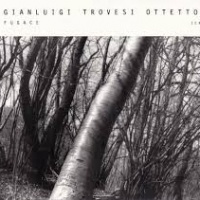84128 / Daten zuletzt bearbeitet von: SJO allgemein
This URL: https://jazzdaten.ch/de/album.php?Album=84128
This URL: https://jazzdaten.ch/de/album.php?Album=84128
CD: Gian Luigi Trovesi Ottetto — Fugace

Label: ECM Records
Label-Nummer: ECM 1827
Label-Nummer: ECM 1827
Aufnahmedatum: 2003
Land: IT
Aufnahmeort: Milano
Tonträger: 1 CD
Italian composer and clarinet master Gianluigi Trovesi has realized his own dream. For over a decade his recordings have included bits and pieces of the American jazz and blues he heard as a child and led him down the path from Bergamo to the world's jazz stages. But Fugace is different. Here, Trovesi and his octet create a veritable soundtrack to a film from the composer's imagination. They pay a great tribute to early American jazz, the kind found rolling down the streets of New Orleans in the teens and early '20s by Louis Armstrong, Sidney Bechet, Jelly Roll Morton, and W.C. Handy. But this is no New Orleans tribute album in the usual sense. Trovesi has incorporated, like his countryman Nino Rota, the traditional folk song and dance forms of Italian music and allowed them to engage early American jazz on their own terms. Tarantellas and blues make great companions (or at least they do here), from the funeral marches evoked in "African Triptych" to the places where "Ramble" and "Blues and West" evoke Armstrong's "West End Blues" in a myriad of contrapuntal exchanges between horns and the rhythm section -- particularly the Trovesi clarinet and the double bass of Roberto Bonati, where long, restrained folk forms grace the 12 bars and free them. There's also the elegant, minimal, slippery swing of "Clumsy Dancing of the Fat Cat Bird," where electronics, cello, guitar, and trumpet vie for the center of a mix that gives way to a hard bop read of certain passages in "St. James Infirmary." In fact, based on this track, the title, and "Canto Di Lavorno," one can feel the influence of movie directors Michelangelo Antonioni and Pier Paolo Pasolini on Trovesi, utilizing music to create the space something will take place in rather than describe the action. From restrained to rollicking to nearly classical and reverent, Fugace is a special recording. It is the most forward-thinking and easily fully realized of Trovesi's distinguished body of work.
